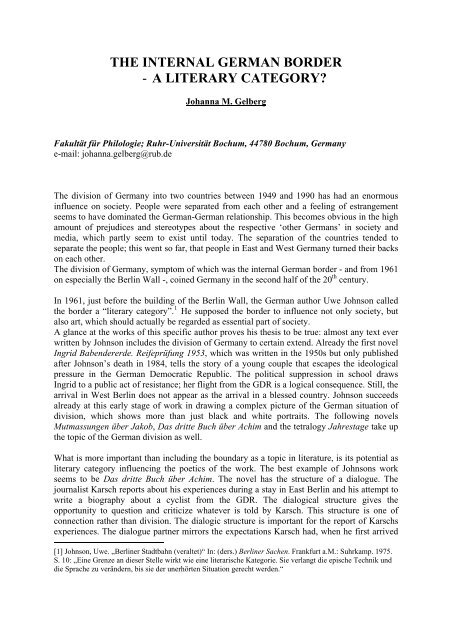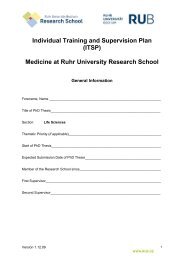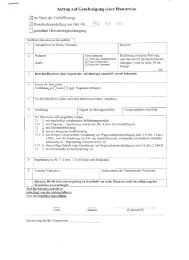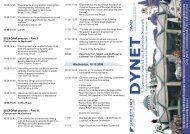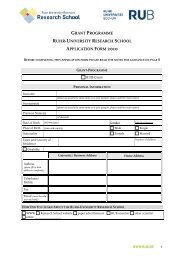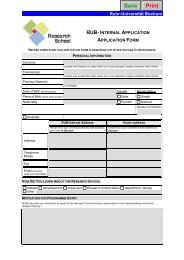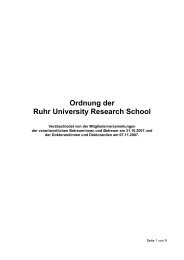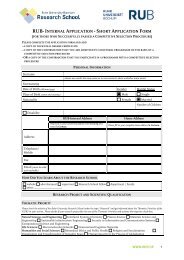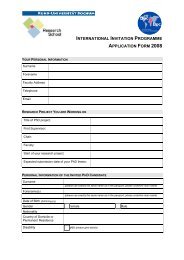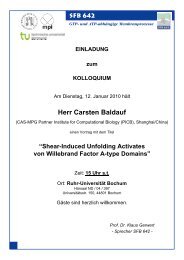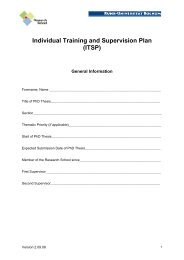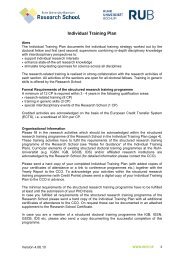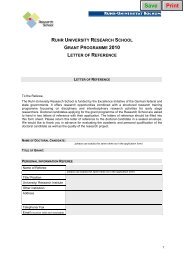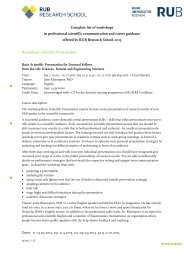Section Days abstract book 2010.indd - RUB Research School ...
Section Days abstract book 2010.indd - RUB Research School ...
Section Days abstract book 2010.indd - RUB Research School ...
You also want an ePaper? Increase the reach of your titles
YUMPU automatically turns print PDFs into web optimized ePapers that Google loves.
THE INTERNAL GERMAN BORDER<br />
- A LITERARY CATEGORY?<br />
Johanna M. Gelberg<br />
Fakultät für Philologie; Ruhr-Universität Bochum, 44780 Bochum, Germany<br />
e-mail: johanna.gelberg@rub.de<br />
The division of Germany into two countries between 1949 and 1990 has had an enormous<br />
influence on society. People were separated from each other and a feeling of estrangement<br />
seems to have dominated the German-German relationship. This becomes obvious in the high<br />
amount of prejudices and stereotypes about the respective ‘other Germans’ in society and<br />
media, which partly seem to exist until today. The separation of the countries tended to<br />
separate the people; this went so far, that people in East and West Germany turned their backs<br />
on each other.<br />
The division of Germany, symptom of which was the internal German border - and from 1961<br />
on especially the Berlin Wall -, coined Germany in the second half of the 20 th century.<br />
In 1961, just before the building of the Berlin Wall, the German author Uwe Johnson called<br />
the border a “literary category”. 1 He supposed the border to influence not only society, but<br />
also art, which should actually be regarded as essential part of society.<br />
A glance at the works of this specific author proves his thesis to be true: almost any text ever<br />
written by Johnson includes the division of Germany to certain extend. Already the first novel<br />
Ingrid Babendererde. Reifeprüfung 1953, which was written in the 1950s but only published<br />
after Johnson’s death in 1984, tells the story of a young couple that escapes the ideological<br />
pressure in the German Democratic Republic. The political suppression in school draws<br />
Ingrid to a public act of resistance; her flight from the GDR is a logical consequence. Still, the<br />
arrival in West Berlin does not appear as the arrival in a blessed country. Johnson succeeds<br />
already at this early stage of work in drawing a complex picture of the German situation of<br />
division, which shows more than just black and white portraits. The following novels<br />
Mutmassungen über Jakob, Das dritte Buch über Achim and the tetralogy Jahrestage take up<br />
the topic of the German division as well.<br />
What is more important than including the boundary as a topic in literature, is its potential as<br />
literary category influencing the poetics of the work. The best example of Johnsons work<br />
seems to be Das dritte Buch über Achim. The novel has the structure of a dialogue. The<br />
journalist Karsch reports about his experiences during a stay in East Berlin and his attempt to<br />
write a biography about a cyclist from the GDR. The dialogical structure gives the<br />
opportunity to question and criticize whatever is told by Karsch. This structure is one of<br />
connection rather than division. The dialogic structure is important for the report of Karschs<br />
experiences. The dialogue partner mirrors the expectations Karsch had, when he first arrived<br />
[1] Johnson, Uwe. „Berliner Stadtbahn (veraltet)“ In: (ders.) Berliner Sachen. Frankfurt a.M.: Suhrkamp. 1975.<br />
S. 10: „Eine Grenze an dieser Stelle wirkt wie eine literarische Kategorie. Sie verlangt die epische Technik und<br />
die Sprache zu verändern, bis sie der unerhörten Situation gerecht werden.“


